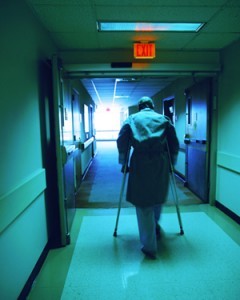Nursing Liability for Spinal Cord Injury
 A patient arrives in the emergency department with a possible spinal cord injury. Or a patient falls in the hospital.
A patient arrives in the emergency department with a possible spinal cord injury. Or a patient falls in the hospital.
One of the first things, which nurses must do, is to assess the patient and determine if there are any changes from the baseline assessment. Recognition of changes in assessment and changes from the baseline assessment are integral in the timely diagnosis of a spine emergencies.
Vital signs monitoring plays a key role. Pain is known as the 5th vital sign. It is important for nurses to follow the pain assessment (location, severity, radiation, character of the pain and relieving factors) and listen to the patient. Neurovascular assessments play an integral role in the assessment of a patient who has any type of spinal emergency.
Cauda Equina – spinal cord injury
Cauda equina syndrome is a dreaded complication of a spinal cord injury that causes devastating injuries to patients. It is a rare disorder affecting the bundle of nerve roots (cauda equine) which is located at the lower end of the spinal cord and is a surgical emergency. If these patients do not get emergent attention, then permanent paralysis, impaired bowel or bladder control, and loss of sexual sensation can result.
Devastating cauda equina symptoms
- Bladder and/or bowel dysfunction (especially urinary retention) causing retained waste or incontinence
- Severe or progressive problems in the lower extremities, including loss or altered sensation between the legs, over the buttocks, the inner thighs and back of the legs (saddle area), area around the rectum and feet/heels.
- Pain, numbness or weakness spreading to one or both legs that may cause the person to stumble or have difficulty getting up from a chair.
- Suspected spinal cord compression – Acute neurologic deficits may be present with cancer patients. Emergent evaluation is needed. The surgeon determines if surgical decompression or radiation therapy is needed.
- Progressive or severe neurologic deficit.
A nursing malpractice suit may be filed when warning signs of spinal compression are not detected or reported by the nurse to the appropriate physician.
Barbara Levin BSN RN ONC CMSRN LNCC is a clinical scholar at Massachusetts General Hospital and an expert witness for orthopaedic and medical surgical cases. Learn more about falls by investing in a copy of Analyzing Falls, Pressure Sore and IV Therapy Cases, written specifically to help legal nurse consultants.
Sharpen your skills for the analysis of a patient fall case. Invest in the recording of a 6 hour course on patient falls: Falls Course: The Impact of Head Injury. View it at your convenience through our digital downloads.
